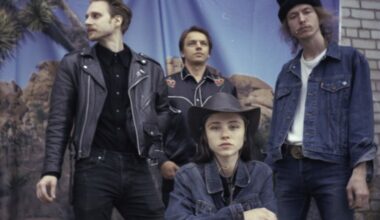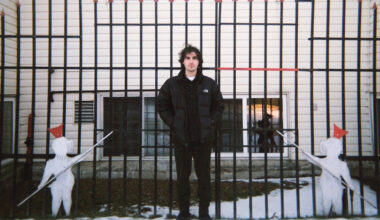Drummer, composer, and educator Jim Black has become one of the most in-demand drummers in avant-garde jazz and experimental rock since emerging as a key member of the New York downtown scene during the ’90s. Born in Daily City, CA in 1967 and raised in the fertile musical scene of Seattle, WA, he moved to Boston and graduated from Berklee College of Music by 1989. During that time Black and his Seattle colleagues Chris Speed and Andrew D’Angelo formed the band Human Feel with guitarist Kurt Rosenwinkel.
By 1991, Black and the other members of Human Feel had moved to Brooklyn, NY, where they found a home in the Downtown music scene then centered around the Knitting Factory and rapidly became among the city’s busiest sidemen. Black’s early years in New York saw him take featured roles in some of the most critically acclaimed bands of the time, like Tim Berne’s Bloodcount, Ellery Eskelin’s trio, Pachora, and Dave Douglas’s Tiny Bell Trio. Thus, began thirty years of near-constant touring and recording, with the above bands as well as artists like Uri Caine, Dave Liebman, Lee Konitz, Steve Coleman, Tomasz Stanko, Nels Cline, and Laurie Anderson.
In 2000, Black started the rock inspired quartet AlasNoAxis, recording six albums of his compositions for the German label Winter & WInter. In 2010 he formed the Jim Black Trio with pianist Elias Stemeseder and Thomas Morgan on bass, recording a total of four albums, their latest award-winning release ‘Reckon’ is available on the Swiss label Intakt.
FACTS:
1: I started a new band called Jim & The Schrimps because Jim Black Quartet is a terribly boring name.
2: Honesty and integrity is a rarified commodity, almost worth paying for by doing the wrong thing.
3: This is not an interview, it is a questionnaire – but I believe in your good intentions. Thanks for asking.
QUESTIONS:
1. What is the biggest inspiration for your music?
I love listening to music. That inspires curiosity and the incessant need to explore multiple tangible expressions of music and the mysteries within it. The chicken crossed the road.
2. How and when did you get into making music?
Drumming on plastic buckets for hours with my cardboard Jackson 5 records cut-out from the back of my childhood cereal boxes. Can you imagine the contract between Motown records and Post “Super Sugar Crisp”?
3. What are 5 of your favourite albums of all time?
Bill Frisell – Before We Were Born
Paul Motian Trio – Live in Tokyo
John Coltrane – Bye-Bye Blackbird
Meshuggah – Nothing Remastered
Joao Gilberto – The Legendary Joao Gilberto… and about 1000 other favorite albums, oh my…
4. What do you associate with Berlin?
After living in NYC for most of my life, it’s lovely to live in a city that has the weight (history plus damages) and experience that also knows it must support its inhabitants. Artists can seemingly draw from this energy and then transcend into their own vehicles of self-expression. The closest thing I’ve seen to living in freedom yet.
5. What’s your favourite place in your town?
That would be Berlin! The restaurant Lokal in Mitte is where I go for therapy.
6. If there was no music in the world, what would you do instead?
Pull coffee in a bar on an intentionally unnamed beach in Alentejo, Portugal.
7. What was the last record/music you bought?
The debut album from killer Berliner drummer Ludwig Wandinger ‘The Gloss Effect’ on Bandcamp.
8. Who would you most like to collaborate with?
Every single person in all of bands and projects I work with, really… I have had the amazing fortune of getting to play with most my childhood heroes. Though, that one dream collaboration would be hands down with the Swedish vocalist Stina Nordenstem. I would write an album of music for her in a heartbeat.
9. What was your best gig (as performer or spectator)?
Playing a big summer festival with my band ALasNoAxis in Central Park, NYC was kind of mega for me.
Seeing Prince in Boston in 1987, Paul Motian Trio at the Village Vanguard in NYC in 2002, and Meshuggah in Berlin in 2016 were unforgettable live experiences.
10. How important is technology to your creative process?
It allows me to globally question and research as fast as I can think, so that really changes the game as far as creative exploration. I have been using Native Instrument’s Reaktor program for 20 years to create electronic sound, and that paradigm alone defines infinity for myself in this lifetime.
11. Do you have siblings and how do they feel about your career/art?
I have an ex-American football playing brother who works for ESPN, and a super intelligent sister who kicks corperate asses a big business. Oddly, my brother recently watched a show of mine in San Francisco and said “duuuuude…the more out, the better…” What more could I want?
Jim Black will be performing as Jim & the Schrimps – featuring Asger Nissen (Alto Sax), Julius Gawlik (Tenor Sax), and Felix Henkelhausen (Acoustic Bass) – at Jazzwoche. The concert takes place at A-Trane, Bleibtreustraße 1, Berlin, on Friday, 14 August at 21:00 CET. Tickets are 20 EUR.
Photo © Schindelbeck


